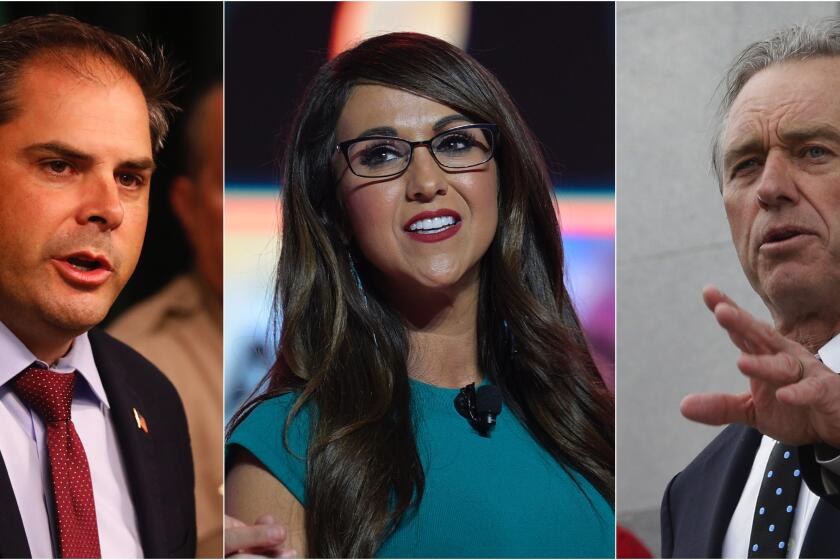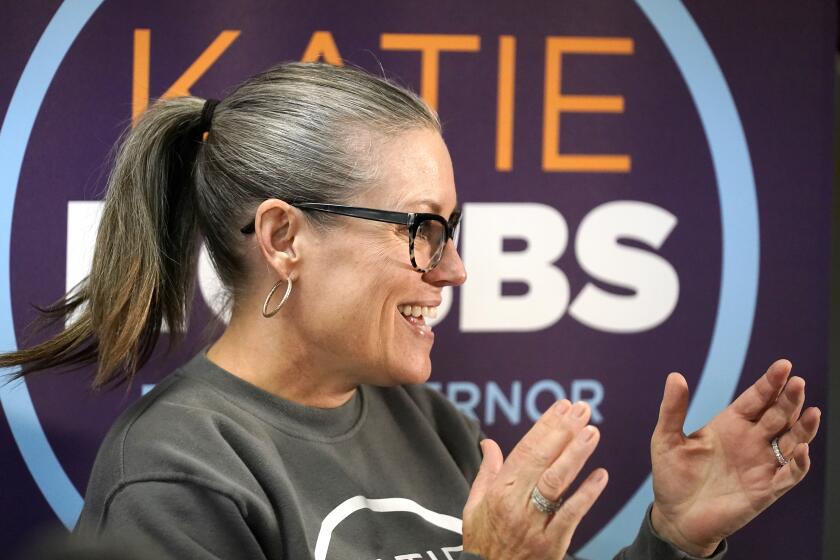Column: In Arizona, fears that yet another flawed candidate may cost GOP control of Senate

When Republicans sought a candidate to take on Arizona Sen. Mark Kelly, a prime target this election season, the obvious choice was Doug Ducey, the state’s accomplished and relatively popular two-term governor.
But when Ducey affixed his signature to papers certifying Joe Biden’s narrow 2020 win in Arizona, pointedly silencing his cellphone when the White House rang, he signed his own death warrant with the party’s Trump-worshiping base.
The result was a venomous GOP primary and a nominee, Blake Masters, whose provocative statements and problematic stances — on abortion, Social Security, former President Trump’s election lies — greatly enhance Kelly’s prospects and undercut Republican hopes of flipping a seat vital to control of the 50-50 Senate.
It’s a pattern repeated across the country.
In Georgia, Ohio and Pennsylvania, Republicans have nominated Senate hopefuls — Herschel Walker, J.D. Vance, Mehmet Oz — who are inept, inarticulate, or both, thanks largely to the support of Trump and his followers.
In New Hampshire, which holds its primary Sept. 13, the GOP front-runner is Don Bolduc, a retired Army general, anti-vaxxer and Trump acolyte, who, among other choice comments, described Confederate monuments as “symbols of hope.”
California Rep. Mike Garcia and others defending former President Trump by drawing analogies to Hitler cheapen history and violate the true victims.
When Republicans were counting on a massive red wave, the roster of fringy and foolhardy candidates didn’t matter quite so much, as a strong tide can buoy even the worst political prospects. But in the more competitive environment that seems to have developed, the party could suffer the consequences it did in 2010 and 2012, when the GOP squandered a good shot at winning the Senate by presenting voters with several lousy choices.
As Senate Republican leader Mitch McConnell dryly observed, “Candidate quality has a lot to do with the outcome.”
In Arizona, one of the country’s most competitive states, the neophyte Masters benefited not just from Trump’s endorsement but from a $15-million infusion from Masters’ former boss, Peter Thiel, the Silicon Valley billionaire and conservative libertarian. Running a hard-edged campaign heavy on dystopian themes, Masters won last month’s five-way GOP primary with 40% of the vote.
He’s been backpedaling ever since.
Raised in Tucson, Masters is 36 and a Stanford graduate, but acts as though he’s much younger, trailing a history of brash and ill-considered statements. He ascribed a 2006 college essay, and its antisemitic overtones, to the impetuosity of youth. But more recently Masters had made a number of other incendiary remarks.
He called Supreme Court nominee Ketanji Brown Jackson a “pedophile apologist,” praised Unabomber Ted Kaczynski as a subversive thinker deserving of wider notice, suggested Black people were responsible for the nation’s plague of gun violence, and promulgated the odious and dangerous notion that Democrats are seeking to replace white Americans with immigrants for political gain.
Since the primary last month, Masters has sought to whitewash some of his earlier positions, deleting language from his website that described him as “100% pro-life,” indicated his support for a constitutional ban on abortion and repeated Trump’s falsehood that the 2020 election was stolen.
He’s also stepped back from the notion of privatizing Social Security, an idea floated in the primary that could gravely damage Masters’ standing with older Arizonans, a key voting bloc in the retirement haven.
“I think, in context, I was talking about something very different,” Masters told the Arizona Republic after winning the nomination. “We can’t change the system. We can’t pull the rug out from seniors.”
The dynamic recalls Arizona’s last midterm election, in 2018, when a Republican with a similarly acerbic and off-putting personality, Martha McSally, lashed herself to Trump, then lost the Senate race to Democrat Kyrsten Sinema, who ran as a more reasoned alternative.
“Republican primary voters are fringe voters and you have to appeal to them to win,” says Mike O’Neil, a Phoenix pollster and longtime political analyst. “But that’s a very unpalatable place to be in a general election.”
Like Sinema without the drama, Kelly is seen as a relative moderate willing to buck his party’s liberal leanings, which helps in a state where registered Democrats trail both independents and registered Republicans. His background — Navy combat pilot, astronaut — also helps. As one Republican strategist put it, “The guy who had a steady hand on the controls of the Space Shuttle is hard to pigeonhole as someone who’s going to go off half-cocked.”
Kari Lake was a television news anchor in Phoenix for decades. Now, the Arizona gubernatorial candidate bashes the media as propagandists and uses her on-air savvy to rally Trump supporters.
Kelly, 58, has long braced for a tough fight — he won narrowly in 2020, when he was elected to serve the remainder of the late John McCain’s term — and has vastly outraised Masters. He’s used his financial advantage to overwhelm his rival on the airwaves, attacking him as an antiabortion extremist.
With polls showing Kelly ahead, and many Republicans privately disparaging Masters, the national party seems to be wavering in its commitment to the race. McConnell’s Senate Leadership Fund canceled millions of dollars in TV advertising after diverting cash to help Vance in Ohio, and there have been reports of party leaders and major GOP donors warning Masters to step up his fundraising, or else.
Of course, the political climate — so different from that a few weeks ago, when Democrats seemed destined for a drubbing — could change back again.
Republicans have to hope so. If Masters loses Arizona and the GOP fails to capture the Senate, they will have only themselves — and Trump — to blame.
More to Read
Get the latest from Mark Z. Barabak
Focusing on politics out West, from the Golden Gate to the U.S. Capitol.
You may occasionally receive promotional content from the Los Angeles Times.













